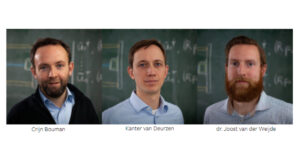Image credits: Cambridge Quantum
The Quantum computing race is heating up! As a result, there is a lurking fear in cryptocurrency communities. One of the most well-known applications of quantum computers is breaking the mathematical difficulty underlying most of the currently used cryptography.
To be specific, blockchain networks utilises non-quantum-resistant cryptographic algorithms, which Quantum computers will be able to break within a short period, says experts.
Get to know the amazing finalists here
Addressing potential threats
In the latest development, Inter-American Development Bank and its innovation laboratory, IDB Lab, together with Cambridge Quantum (CQ) and Tecnológico de Monterrey, have identified and resolved potential threats to blockchain networks posed by the advent of quantum computer development.
“While certain quantum algorithms allow for breaches of digital security protocols, luckily we also have others we can use to strengthen our data protection capabilities”, says Salvador E. Venegas-Andraca Professor-Researcher and Director of the Quantum Information Processing Group of Tecnológico de Monterrey.
According to the project team, four potential threat areas for blockchain networks have been identified, including communication between network nodes and the integrity of digitally signed transactions.
Each threat area relies on cryptography and keys, which are vulnerable to attacks by quantum-computer. Further, it needs improvement to ensure the security and integrity of blockchain networks.
How did they do it?
In an attempt to address these threats, the team has developed a post-quantum cryptography layer to protect networks and offer resistance to quantum computer attacks.
As per the company’s claims, the layer was developed on the LACChain Besu blockchain network, based on Ethereum technology.
Duncan Jones, Head of Quantum Cybersecurity at CQ, emphasises that “LACChain blockchain was an ideal target for keys generated by our IronBridge platform. Only keys generated from certified quantum entropy can be resistant to the threat of quantum computing”.
Transactions and communications were protected with quantum-proof keys from CQ’s IronBridge platform, which uses quantum computers to generate certified entropy.
Irene Arias Hofman, CEO of BID Lab, says that “in the digital age in which we find ourselves we have at our disposal different emerging technologies with the capacity to solve social problems, and to the extent that we can combine them we will achieve an exponential impact. In this case, the knowledge of the IDB team, together with CQ and TEC, in both quantum and blockchain technologies, has made it possible to achieve a fundamental milestone to guarantee the future integrity of LACChain, a blockchain platform created by the IDB Lab which more than 50 entities in the region are using already”.
IDB Lab: What you need to know
IDB Lab is the innovation laboratory of the IDB Group. The primary goal of IDB Lab is to promote innovation for inclusion in the region, mobilising financing, knowledge, and connections to test private sector solutions at an early stage with the potential to transform the lives of vulnerable populations by economic, social, and environmental conditions.
Cambridge Quantum: What you need to know
Founded in 2014, Cambridge Quantum Computing (CQC) is an independent quantum computing software company, with operations in the US, Europe & Japan. The company builds tools for the commercialisation of quantum technologies.
Tecnológico de Monterrey: What you need to know
Founded in 1943, Tecnológico de Monterrey is a private, non-profit, independent institution. Through the promotion of research, the generation of knowledge transfer models and technology promotes the building of a knowledge-based economy to support the economic, political, and social development of the country’s regions.
How partnering up with Salesforce helped him succeed!










